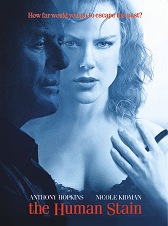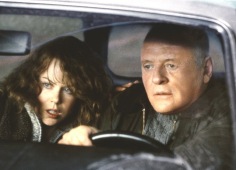|
The Human Stain
|
| |
 |
USA, 2003. Rated R. 106 minutes.
Cast:
Anthony Hopkins, Nicole Kidman, Ed Harris, Gary Sinise, Wentworth Miller,
Jacinda Barrett, Harry Lennix, Clark Gregg, Anna Deavere Smith, Lizan
Mitchell, Kerry Washington
Writer: Nicholas Meyer, based on the novel by Philip Roth
Original Music: Rachael Portman
Cinematography: Jean Yves Escoffier
Producers: Gary Lucchesi, Scott Steindorff, Tom Rosenberg
Director: Robert Benton
LINKS
|
 t
the core of The Human Stain dwells the philosophical belief that we are
all intrinsically flawed. Understand that, and you understand the film's theoretical
framework. You understand its symbolism and mythological references. You get
its dialogue. You are then free to explore why the hell Anthony Hopkins is getting
sweaty with Nicole Kidman.
t
the core of The Human Stain dwells the philosophical belief that we are
all intrinsically flawed. Understand that, and you understand the film's theoretical
framework. You understand its symbolism and mythological references. You get
its dialogue. You are then free to explore why the hell Anthony Hopkins is getting
sweaty with Nicole Kidman.
If you take issue with the film's "we are born bad" theory, then riddle me
this: Why do we have to teach children to share, but not to lie? Answer: Because
we are rigged for survival. Even if we live life as best we can, we will "sin"
or make mistakes. Further, if we take risks and really eat life, we will make
even larger mistakes—sometimes at the expense of others. These indelible
marks are unfortunate and may even be tragic, but they proclaim our humanity.
They are proof that we were here. They are our "stains."
Adapted from Philip Roth's PEN/Faulkner Award-winning novel of the same name,
The Human Stain is set in the U.S. during the Clinton-Lewinsky scandal—a
perfect play on the title. (We all remember "the blue dress" incident, and the
literal, uh, stain.) The late 1990s was a strange, pseudo-Puritanical period
of the American psyche. You can't really blame us; we had nothing else to worry
about. Indeed, before 9/11, before the dot.com bust, and before our "War on
Terror," there was a brief era when America was (as Roth puts it) "preoccupied
with cock sucking."
The Human Stain recounts the story of Coleman Silk (Anthony Hopkins),
a revered Classics professor and former dean at Athena College, a small, liberal
arts institution. Due to an offhand comment that is inaccurately perceived as
racist, Coleman loses his position. (Let us not forget that this was also the
era of political correctness.) When he tells his wife, she collapses and dies.
Coleman seeks out reclusive author, Nathan Zuckerman (Gary Sinise) to document
"the great screw over" that went down at Athena College. The two men—Coleman
full of life, though battered by it; Zuckerman too afraid to live it—quickly
form a strong friendship.

Nicole Kidman and Anthony Hopkins in The Human Stain |
Coleman reveals that he is having an affair with Faunia (Nicole Kidman), a
farmhand and cleaning lady who is half his age. Faunia has ignited a fire within
Coleman. This fire does not make any sense and is on many levels purely ridiculous,
but that is precisely the reason it works. It is primal, and hence more genuine.
Their union is quite the scandal in town and has Faunia's ex-husband (played
by Ed Harris) completely enraged. The closer Faunia and Coleman become, the
more their class/age gap is bridged. The audience sees two lonely souls carrying
a lot of secrets and trying to feel something else besides guilt and sadness,
if only for a little while.
The Human Stain's narrative unfolds on three planes: the evolution of
Coleman and Faunia's relationship, Coleman's interaction with Nathan as friend
and writer, and flashbacks of Coleman's past. It is through the "Coleman's past"
segments that we discover his secret: Coleman Silk is actually a very light-skinned
African-American. Part of a phenomenon American historians have termed "racial
passing," young Coleman (played by Wentworth Miller) abandoned his ethnicity
and family in his early 20s and began living a new life as a white man...and
a liar.
Coleman's decision to code himself as white is not a function of self-hatred
or shame. He makes a feeble attempt to merge both worlds, by introducing his
family to his white girlfriend and first love, Steena (Jacinda Berrett). This,
however, was in the 1940s, and upon discovering that Coleman is really a "Negro,"
Steena rejects him. His subsequent "passing" is the most ironic and fascinating
aspect of Coleman's character. In order to be "free" to live a better life,
he becomes a prisoner in his own body. This is our hero's tragic flaw.
Because of its very heavy themes of identity displacement, self-transformation,
acceptance, truth, and regret, The Human Stain warrants a great director
and very serious actors. It has both. Director Robert Benton (Kramer vs.
Kramer, Places in the Heart) elicits excellent performances. Ed Harris delivers
a searing portrayal of Faunia's ex-husband, even though it is little more than
a cameo. Kidman's natural Helen of Troy-ness melts away and, as Faunia, she
is no longer beautiful and lean, but skinny and gawky, even trashy. Her performance
is perfect, and she does it without reaching for a prosthetic nose.
However, The Human Stain suffers from a casting flaw so obvious that
it undermines all of the above, and infects its entire experience. The great
Anthony Hopkins playing Coleman Silk causes what might have been a great film
to fizzle into mediocrity. Do not get me wrong. Hopkins is one of the best and
most versatile actors working today. He is believable as Hitler. He is believable
as a refined psychopath. He is believable as a butler. He is believable as a
quirky Kellogg. He is believable as the father of Cubism. He is even believable
as an aging and jaded professor in bed with someone half his age. He is just
not believable as an African-American male...not even a light-skinned Classics
professor who is concealing the fact that he is an African-American male.
Because of this miscasting, other scenes are ruined. Wentworth Miller, who
plays young Coleman, acts more like a young Hopkins. While Miller and Hopkins
share certain mannerisms, a mole on the left temple, and green eyes (Hopkins
wore contact lenses for the role.), they also share an odd, Welsh/American accent.
The accent is fine, when we consider Coleman Silk, the ex-Classics professor.
(Such accents really happen to Classics professors for some reason; don't ask
me why.) But we are forced to ask ourselves when we see young Coleman around
his African-American family, "Why does this kid sound NOTHING like his natural
parents and siblings?" Then we realize he sounds like this because he is going
to be Anthony Hopkins in a little while. If Benton and crew absolutely had to
use Hopkins in the title role, this awkwardness could have been addressed via
a scene in which Coleman tries to "unlearn" his original way of speaking—another
documented element of "passing." Sadly, no such scene exists, and we are left
preoccupied with this great casting fumble.
When viewing a film, you should not be scanning your mental bank for a more
suitable actor for the title role. Such is the case with The Human Stain.
True to its core message, the film's most memorable feature is its most significant
flaw.
Review
© October 2003 by AboutFilm.Com and the author.
Images © 2003 Miramax Films. All Rights Reserved.


